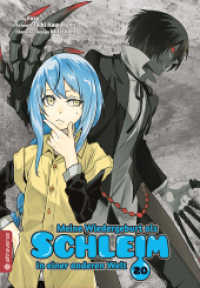- ホーム
- > 洋書
- > 英文書
- > Literary Criticism
Full Description
Until the 1940s, when awareness of Russian Formalism began to spread, literary theory remained almost exclusively a Russian and Eastern European invention. The Birth and Death of Literary Theory tells the story of literary theory by focusing on its formative interwar decades in Russia. Nowhere else did literary theory emerge and peak so early, even as it shared space with other modes of reflection on literature. A comprehensive account of every important Russian trend between the world wars, the book traces their wider impact in the West during the 20th and 21st centuries. Ranging from Formalism and Bakhtin to the legacy of classic literary theory in our post-deconstruction, world literature era, Galin Tihanov provides answers to two fundamental questions: What does it mean to think about literature theoretically, and what happens to literary theory when this option is no longer available? Asserting radical historicity, he offers a time-limited way of reflecting upon literature—not in order to write theory's obituary but to examine its continuous presence across successive regimes of relevance. Engaging and insightful, this is a book for anyone interested in theory's origins and in what has happened since its demise.
Contents
Prologue: What This Book Is and Is Not About
Introduction: The Radical Historicity of Literary Theory
1. Russian Formalism: Entanglements at Birth and Later Reverberations
2. A Skeptic at the Cradle of Theory: Gustav Shpet's Reflections on Literature
3. Toward a Philosophy of Culture: Bakhtin beyond Literary Theory
4. The Boundaries of Modernity: Semantic Paleontology and Its Subterranean Impact
5. Interwar Exiles: Regimes of Relevance in Émigré Criticism and Theory
Epilogue: A Fast-Forward to "World Literature"







